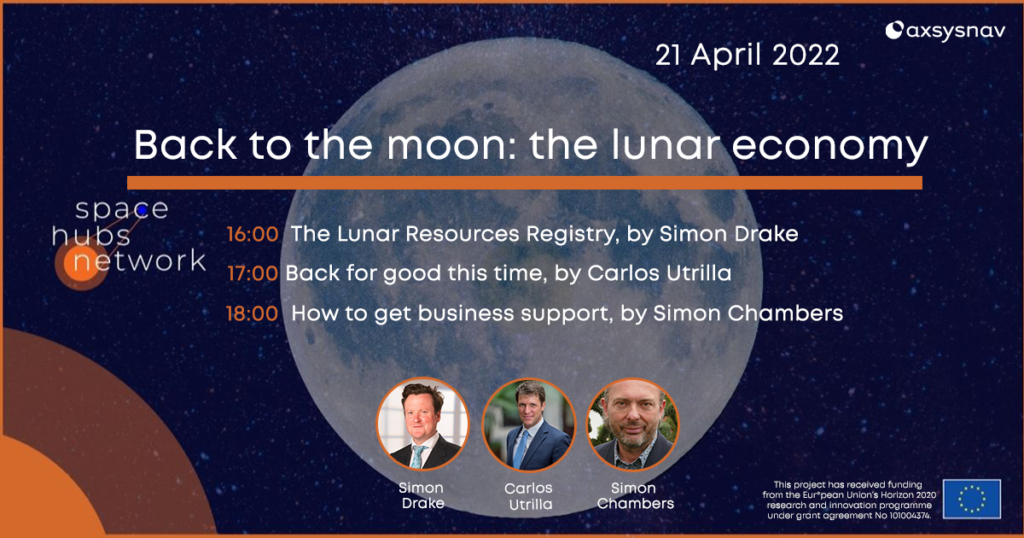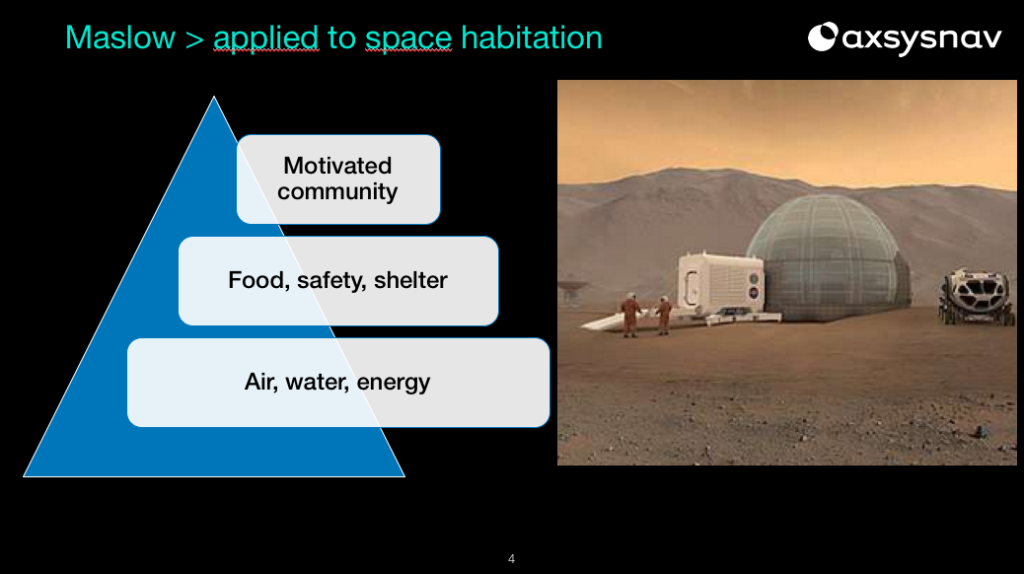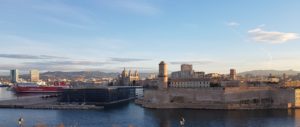Established 17 years ago in Toulouse, the company carries out studies, business consulting and project management in the following areas: Wildfire detection and management, space robotics and applications using space data. Clients are from space agencies, public organisations and the private sector (entrepreneurs, SME and blue-chips). 47M€ of funds have been raised for private clients.
You are browsing archives for
Category: Non classé
Back to the Moon – the Lunar economy
The event was recorded; https://lnkd.in/edBwiksn#lunar_economy

Just a reminder that the SUN roadshow entitled Back to the Moon – the Lunar economy is on Thursday 21st April from 16-18 CEST. The online event will be of interest to all players in the burgeoning Lunar economy and budding space entrepreneurs. The SUN spacehubs.network provides business support for entrepreneurs and SME to get more involved in space. With presentations by Simon Drake from the Lunar Resources Registry and Carlos Utrilla from Plus Ultra Space Outposts, we get right to the heart of the matter!
16:00 Welcome
16:10 The Lunar Resources Registry, by Simon Drake
17:00 Back for good this time, by Carlos Manuel Entrena Utrilla
18:00 How to get business support from the spacehubs.network, by Simon Chambers
This is a SUN roadshow, register here for the event.
The €15bn unified EU space programme
The European Parliament has finalised a new €14.8 billion seven-year EU space program, which will for the first time bring together all EU space activities under one roof. Running the space program under a single regulation is intended to get rid of redundancy and overlaps between the European Space Agency and the European Commission. The goal is to make the EU a global player in space, rivaling the position of the US and China.
The programme will support existing EU space initiatives, such as Galileo and Copernicus, as well as some new tools for space surveillance and satellite communications. €9.1 billion will fund the satellite navigation system Galileo, and the European Geostationary Navigation Overlay service, which supplements Galileo’s observations by double-checking the accuracy of its positioning data. Another €5.42 billion will be invested in the Copernicus earth observation system, to run services monitoring the atmosphere, marine and land environments, climate, emergencies and security.
All this will be overseen by three institutions. The Commission will manage the overall programme; the new EU Agency in Prague for the Space Programme (EUSPA) will manage Galileo and the European Geostationary Navigation Overlay Service; while the European Space Agency will be responsible for research and development.
Horizon Europe 2021-2027 provides €95 billion for research and innovation
Horizon Europe, the EU research and innovation programme will have a budget of around €95.5 billion for 2021-2027. This includes €5.4 billion from NextGenerationEU (see post below) to boost recovery and make the EU more resilient for the future, as well as an additional reinforcement of €4.5 billion. Overall this represents a 30% increase vis-à-vis the current research and innovation programme, Horizon 2020 and makes it the most ambitious research and innovation programme in the world.
The aim is to strengthen the region’s scientific and technological base, develop solutions for healthier living, drive digital transformation and fight climate change, for the EU’s collective resilience. This political agreement is now subject to formal approval by the European Parliament and Council.
How to live in space
Axsysnav has performed a study for the French space agency (CNES) that created a database of organisations working in the area of space habitation. A public-friendly extract of the data has been prepared and made into a presentation. We invite you to have a look at how humans could be living on the moon, mars and beyond in 2040.

European Space Week in Marseille
We are at the European Space Week, being held in Marseille from 3-6 December. Over 1000 delegates learning about the latest developments and business opportunities in GNSS and Copernicus.
Simon Chambers, MD of Axsysnav, is mentoring winners selected by the Copernicus Accelerator, for the third year running: “a great enabler to get your idea to market, this year there are many projects in the area of climate change, resource management, air quality monitoring and forest management”. The companies being mentored will benefit from one year’s coaching by dedicated European professionals.
The European Commission has estimated that between 2017 and 2035, Copernicus will generate at least €67 billion in benefits for European society. In economic terms, the sector has experienced an AGR of 17% on average between 2014 and 2017.
Contact us today for more details about how you can get involved in the Earth Observation industry!
Copernicus mentoring for the European Commission
The European Commission, in the frame of the H2020 programme, has re-appointed Simon Chambers, for the fourth consecutive year as a business mentor to help create innovation in the Earth Observation sector (safety, environment, transport and climate).
Private companies, equipped with an EO application idea, will benefit from business process mentoring in order to get their service to market as soon as possible.
SME from all over Europe are eligible for this support in order to foster innovation and create new opportunities in this exciting market. Have a look www.copernicus.eu
Simon Chambers is also a certified coaching for another EC programme, the H2020 SME Instrument and has performed over 20 assignments for private companies in Europe.


 English
English Français
Français